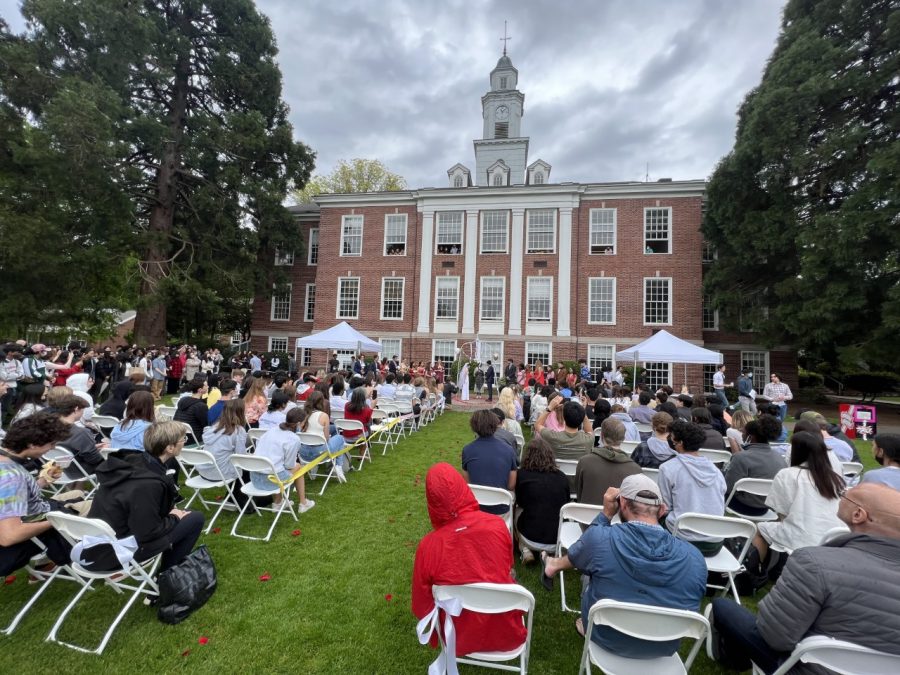Senior Prank to Do Away With Surprises, Implement Public Planning
Lakeside’s administration recently announced further changes to be implemented immediately concerning one of the institution’s oldest traditions — indeed, a tradition that exists in practically every high school around the country — senior pranks.
Presently, senior pranks are strategically planned months in advance by a select “Senior Prank Committee.” Upon deliberating and deciding on a prank, the idea is then passed to the administration, who ultimately approves or rejects the idea. After, a date is determined for the prank.
However, a majority of the administration still felt this level of control was not enough. Per sources who spoke to Tatler on the condition of anonymity, the previous year’s prank of a false marriage was for many, a jarring experience. Specifically, many described reports of shock or surprise when Hieu T. ’22 popped the question to Ann W. ’22 at an otherwise innocuous assembly. “This is not conducive to a high school environment,” said one administrator. The group leading the push for stricter rules say that surprise pranks create higher levels of stress and violate community trust.
Moreover, there have been complaints about the concept of a “senior prank” itself. “Why should Seniors be the only ones allowed to pull off a prank without repercussions?” one puzzled Freshman asked. “It makes me feel especially excluded when I have to sit idly and witness a prank that affects the whole school yet that I didn’t have any part in.”
Such input seems to be the impetus for the sweeping changes being instituted for senior pranks this year, which the school recently posted to its Twitter page. Among some of the most impactful, the committee planning senior pranks will now be obligated to host a vote for the whole school eight weeks before the prank. Gathering students in the gym, the Committee will introduce their vision before welcoming voting where absolute unanimity is required to pass the prank.
If the vote fails, then the committee must scrap their idea and undergo a process named “narrow and inclusive rethinking” or NIR. Under the NIR framework, 25% of each grade will be polled on their ideas for a senior prank. Thereafter, the committee will be permitted to put a second idea to a vote that needs only a supermajority to pass; however, the new prank must demonstrably incorporate ideas generated by NIR polling.
In addition to this, the Committee is mandated to send three emails to the entire student body every day for a week before the prank detailing what will happen, who will be involved in the senior prank, and where/when it will take place.
It’s important to mention that not all reforms the administration originally sought were approved. Notably, the administration decided to table a proposal that would dissolve the senior prank planning committee and instead create an alternative planning body consisting of students from all grades. Furthermore, an effort was made by the athletics department to set up a similar committee that would review spirit day themes. Citing similar concerns over school-day disruption, the department petitioned for protocols that would see teams submit their spirit themes four weeks in advance to a mixed admin and all-grade body that would review the themes. Ultimately, it was decided that the idea should be put on hold and revisited in earnest next year.
Recently, reception to the new policies among current seniors has remained mixed. Many have pointed out some new policies are harsh, such as one that holds that if both all-school votes fail, the senior prank for that year will be deemed “unreceptive by the community” and canceled. However, the same anonymous members of the administration posit this probably won’t happen, and remain optimistic about the changes’ positive impact: “We always encourage student spontaneity and fun, so long as it demonstrates thoughtful deliberation and planning, which this new framework will bring.”
Conceitedly, his favorite month is December
As his birthday falls in December 2006
And even more, his favorite holiday is that of December 25
As...

